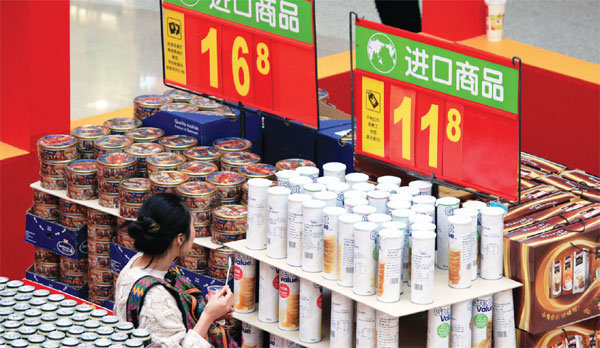Nansha steps in to help fight parallel goods traders
Updated: 2015-05-05 07:07
By Zhou Mo in Shenzhen(HK Edition)
|
|||||||||
|
A consumer shops at an imported goods area of a supermarket on the mainland. The prices on offer in the "experience store" in the newly established Guangdong free trade zone are generally 30 to 50 percent lower than those of products sold elsewhere on the mainland. Asia News Photo |
Guangzhou has stepped up efforts to help Hong Kong in the war on parallel goods traders with the opening of the biggest "experience store" in the Guangdong provincial capital for the direct purchase of foreign products.
The store opened last Friday in the Nansha district, which is part of the new China (Guangdong) Pilot Free Trade Zone (FTZ), where residents can now buy imported commodities at prices lower than Hong Kong's.
The 10,000-square-meter facility drew more than 10,000 visitors on its first day of operation. More than 30 cross-border online enterprises have set up businesses there, offering a wide range of products, including baby milk powder, maternal and child supplies, food, wine, cosmetics and bags.
The prices on offer are generally 30 to 50 percent lower than those of products sold elsewhere on the mainland. Besides, some commodities, such as seafood and baby milk formula, are going at bargain prices or even cheaper than in Hong Kong.
Xu Qing, a 27-year-old piano teacher in Guangzhou, said she used to ask friends to buy skin care products for her in Hong Kong, but now she can make those purchases herself at the new store.
"Although there are other 'experience stores' for bonded imports in Guangzhou, this is by far the biggest of its kind," she said. "It's like a supermarket. I feel just like shopping in Hong Kong. What's important, the prices are relatively low and the goods quality is high."
Others shoppers, however, have different views.
"I don't see any big meaning in it. I cannot get bonded products and take them home immediately. I still have to make orders online and wait for several days for delivery. There's not much difference from shopping on overseas websites," said a 33-year-old human resources manager.
The products sold are imported directly by cross-border e-commerce companies and stored in bonded areas in Guangzhou. Customers place their orders online and the products will be delivered to their homes within three days.
Cross-border online business has been expanding rapidly in Nansha. Top Ideal - one of Guangdong's biggest supply-chain enterprises catering to cross-border e-commerce enterprises - started operations in Nansha a decade ago.
"In the beginning, we received less than 100 orders daily. But now, we have more than 10,000 orders," said Li Jinling, the company's vice-president.
Nansha's inclusion in the Guangdong FTZ, which was officially launched last month, is expected to push the development of the emerging industry, such as by making it more convenient for exchange settlement and financing for cross-border e-commerce companies.
In the past, exchange settlement could be completed only after money had been transferred to overseas accounts. In the FTZ, money transferred to accounts in Nansha could be viewed as the completion of exchange settlement, Li explained.
"Moreover, enterprises in the free trade area could expect to finance low-cost overseas capital," she added.
(HK Edition 05/05/2015 page9)
